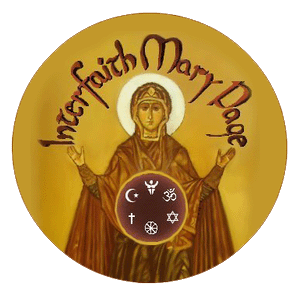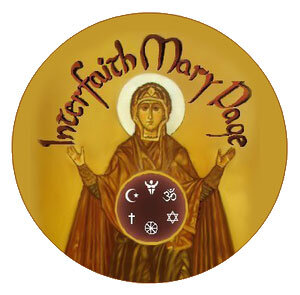Anjony, France
Photo: Francis Debaisieux
Our Lady of Anjony
In the chapel of the beautifully preserved 15th century fort Château d'Anjony near the village Tournemire, Cantal department, Auvergne, probably 17th century, painted wood.
Since nothing is related of her origin and she shares the geometric pattern of the robes of the much more famous Black Madonna of Le-Puy, she may well have been created as a copy of the latter. The hand postures of mother and child differ slightly from those of Le-Puy, but coincide exactly with Our Lady of the Snows in Aurillac, who is definitely considered a copy of Our Lady of Le-Puy.
Though she is a humble Madonna with no miracle stories to her name, I love her Negroid features and simple, exotic look.
This Lady is a perfect example of the 'Seat of Wisdom' or 'Majesty' type of Madonna. These are characterized by the mother seated on an ancient throne without a back or with a low back, holding the child squarely on her lap, and both looking straight ahead. You won't find demurely down cast eyes in these images, but a powerful straight stare. In the language of medieval symbolism this means that Mary is the throne of Jesus, the Seat of Wisdom. From her lap spring wisdom and power. She is represented as the Christian embodiment of Lady Wisdom, a personage described in the Hebrew Bible (the Old Testament) as the first companion or the feminine face of God, through whom he draws people to himself. Much of what the Old Testament says about Wisdom is later attributed to the Holy Spirit and to Christ but also to his mother. Here are some excerpts from the Book of Wisdom, chapters 7-9:
Anjony Castle
7:21-27: "Such things as are hidden I learned and such as are plain; for Wisdom, the artificer of all, taught me. For in her is a spirit intelligent, holy, unique … all-powerful, all-seeing, and pervading all spirits. … she penetrates and pervades all things by reason of her purity. For she is an aura of the might of God and a pure effusion of the glory of the Almighty; … she is the refulgence of eternal light, the spotless mirror of the power of God, the image of his goodness. And she, who is one, can do all things. … And passing into holy souls from age to age, she produces friends of God and prophets. 8:1: "Indeed she reaches from end to end mightily and governs all things well." 9:9: "Now with you [God] is Wisdom, who knows your works and was present when you made the world;"
Mary inherited the title 'Seat of Wisdom' from the Egyptian goddess Isis, who, like Mary, was often portrayed with her son Horus on her lap. In Egypt it was clear, who ever sat on the lap of the Great Goddess received his power from her. Hence pharaohs would frequently portray themselves seated on this divine throne of wisdom as a justification of their power.
Many Christians are uncomfortable with the idea that Jesus’ power comes from his mother and so they prefer to interpret Jesus as the embodiment of Wisdom and Mary as the mere seat on which his wisdom is presented. Nonetheless the devotees of Mary have no trouble seeing her as the primordial face of Lady Wisdom and her son as an expression and manifestation of that same face.




